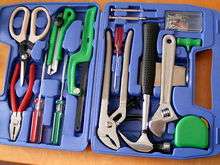tool
English

Etymology
From Middle English tool, from Old English tōl (“tool, implement, instrument”, literally “that with which one prepares something”), from Proto-Germanic *tōlą (“tool”), from Proto-Indo-European *dewh₂- (“to tie to, secure”), equivalent to taw (“to prepare”) + -le (agent suffix). Cognate with Scots tuil (“tool, implement, instrument, device”), Icelandic tól (“tool”), Faroese tól (“tool, instrument”). Related to Old English tāwian (“to make, prepare, or cultivate”); see taw, and tow ("fibres used for spinning").[1][2]
Pronunciation
- IPA(key): /tuːl/
Audio (file) - Rhymes: -uːl
- Homophone: tulle
Noun
tool (plural tools)
- A mechanical device intended to make a task easier.
- Hand me that tool, would you? I don't have the right tools to start fiddling around with the engine.
- Equipment used in a profession, e.g., tools of the trade.
- 2012 March 1, Brian Hayes, “Pixels or Perish”, in American Scientist, volume 100, number 2, page 106:
- Drawings and pictures are more than mere ornaments in scientific discourse. Blackboard sketches, geological maps, diagrams of molecular structure, astronomical photographs, MRI images, the many varieties of statistical charts and graphs: These pictorial devices are indispensable tools for presenting evidence, for explaining a theory, for telling a story.
- These are the tools of the trade.
-
- Something to perform an operation; an instrument; a means.
- 2013 July-August, Catherine Clabby, “Focus on Everything”, in American Scientist:
- Not long ago, it was difficult to produce photographs of tiny creatures with every part in focus. […] A photo processing technique called focus stacking has changed that. Developed as a tool to electronically combine the sharpest bits of multiple digital images, focus stacking is a boon to biologists seeking full focus on a micron scale.
-
- (computing) A piece of software used to develop software or hardware, or to perform low-level operations.
- The software engineer had been developing lots of EDA tools. a tool for recovering deleted files from a disk
- A person or group which is used or controlled, usually unwittingly, by another person or group.
- He was a tool, no more than a pawn to her.
- (slang) Penis.
- (by extension, slang, derogatory) An obnoxious or uptight person.
- He won't sell us tickets because it's 3:01, and they went off sale at 3. That guy's such a tool.
Synonyms
- See also Thesaurus:penis
- See also Thesaurus:tool
Related terms
Translations
|
|
|
|
- The translations below need to be checked and inserted above into the appropriate translation tables, removing any numbers. Numbers do not necessarily match those in definitions. See instructions at Wiktionary:Entry layout#Translations.
|
Verb
tool (third-person singular simple present tools, present participle tooling, simple past and past participle tooled)
- (transitive) To work on or shape with tools, e.g., hand-tooled leather.
- (transitive) To equip with tools.
- (intransitive) To work very hard.
- 1965, Matt Fichtenbaum and Dan Murphy, “The Institute Screw” in The Broadside of Boston, vol. III, No. 22:
- Do this lab and read this book, now tool, one and all,
And be sure and pass that final quiz or be screwed right to the wall.
- 1965, Matt Fichtenbaum and Dan Murphy, “The Institute Screw” in The Broadside of Boston, vol. III, No. 22:
- (transitive, slang) To put down another person (possibly in a subtle, hidden way), and in that way to use him or her to meet a goal.
- Dude, he's not your friend. He's just tooling you.
- (transitive, volleyball) To intentionally attack the ball so that it deflects off a blocker out of bounds.
- (transitive, Britain, slang, dated) To drive (a coach, etc.)
- (intransitive, slang) To travel in a vehicle; to ride or drive.
- Illust. American
- boys on their bicycles tooling along the well-kept roads
- 2011, Ben Aaronovitch, Rivers of London, Gollancz 2011, page 324:
- These are the guys that tool around in Mercedes Sprinter vans with equipment lockers stuffed with everything from riot helmets to tasers.
- Illust. American
Synonyms
- (volleyball): use
Derived terms
Translations
|
- The translations below need to be checked and inserted above into the appropriate translation tables, removing any numbers. Numbers do not necessarily match those in definitions. See instructions at Wiktionary:Entry layout#Translations.
References
- Carus, Paul (1893) The philosophy of the tool, Chicago: The Open Court Publishing Company, pages 3-4
- Hall, John Richard Clark (1960) A Concise Anglo-Saxon Dictionary, Supplement by Herbert D. Merritt, 4 edition, Cambridge University Press, published 1984, →ISBN, pages 338 & 345
Estonian
Etymology
Borrowed from Middle Low German stôl (“chair”).
Pronunciation
- IPA(key): /ˈtoːlʲ/
Noun
tool (genitive tooli, partitive tooli)
- chair
- 1968, Peet Vallak, Tuuled ümber maja: novellivalimik, page 200:
- Siis läks kogu ta vallasvara oksjonile ning mõni siiasiginenud tool, laud, voodi, kapp ja sööginõud olid nüüd seaduslikult naise-ema omad.
- Then all his personal property was put up for auction and any chair, table, bed, or dishes he had taken possession now belonged legitimately to his mother-in-law.
- 1968, Peet Vallak, Tuuled ümber maja: novellivalimik, page 200:
Declension
This noun needs an inflection-table template.
Middle English
Etymology 1
From Old English tōl, from Proto-Germanic *tōlą.
Pronunciation
- IPA(key): /toːl/
Noun
- A tool, implement, or instrument.
- A instrument of war; an armament.
- (rare) A device used for torturing or interrogration.
- (rare, vulgar) A penis.
References
- “tọ̄l (n.(3))” in MED Online, Ann Arbor, Mich.: University of Michigan, 2007, retrieved 2018-05-03.
Etymology 2
From Old English toll.